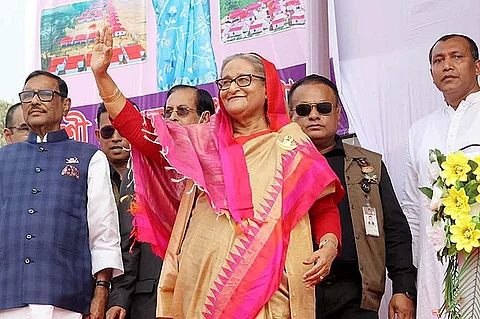

Bangladesh’s International Crimes Tribunal (ICT) initiated its first trial on May 25, 2025, targeting eight former police officials accused of crimes against humanity during the August 2024 crackdown on student-led protests.
The charges relate to the killing of six protesters in Dhaka’s Chankharpul area on August 5, 2024—the day former Prime Minister Sheikh Hasina fled to India amid mass unrest.
Four defendants are in custody, while four, including ex-Dhaka police commissioner Habibur Rahman, are being tried in absentia.
Charges and Evidence
Chief Prosecutor Tajul Islam outlined charges ranging from “superior command responsibility” to direct orders and participation in killings. Evidence includes video footage of the violence, bullet fragments from victims’ bodies, and voice recordings allegedly capturing Hasina ordering the use of lethal force. A letter from victim Anas Khan to his mother, written before joining protests, was also submitted. The prosecution claims Hasina labeled protesters as “Razakars” (collaborators with Pakistan during the 1971 Civil War), inciting state forces and Awami League affiliates to attack them.
Context of the 2024 Uprising
The trial stems from a July–August 2024 uprising sparked by student demands to abolish a controversial government job quota system. The UN estimates 1,400 protesters and civilians were killed during Hasina’s suppression campaign, which included shootings, enforced disappearances, and arson. Survivors reported police firing rifles at close range and burning bodies to destroy evidence.
Hasina’s Exile and Broader Accountability
Hasina, now in India, faces separate charges of crimes against humanity and contempt of court for allegedly stating she had a “licence to kill 226 people”. The ICT extended deadlines for investigations into additional cases, including the burning of six bodies in Savar, where new video evidence emerged 14. Meanwhile, interim leader Muhammad Yunus seeks her extradition, risking diplomatic tensions with India.
Tribunal’s Controversial Legacy
The ICT, established by Hasina in 2009 to prosecute 1971 war crimes, is now being used against her allies. Critics note its history of politicized verdicts under Hasina, including the execution of opposition figures. Current trials face scrutiny for potential retaliation, with over 60 Awami League-linked lawyers arrested in April 2025.